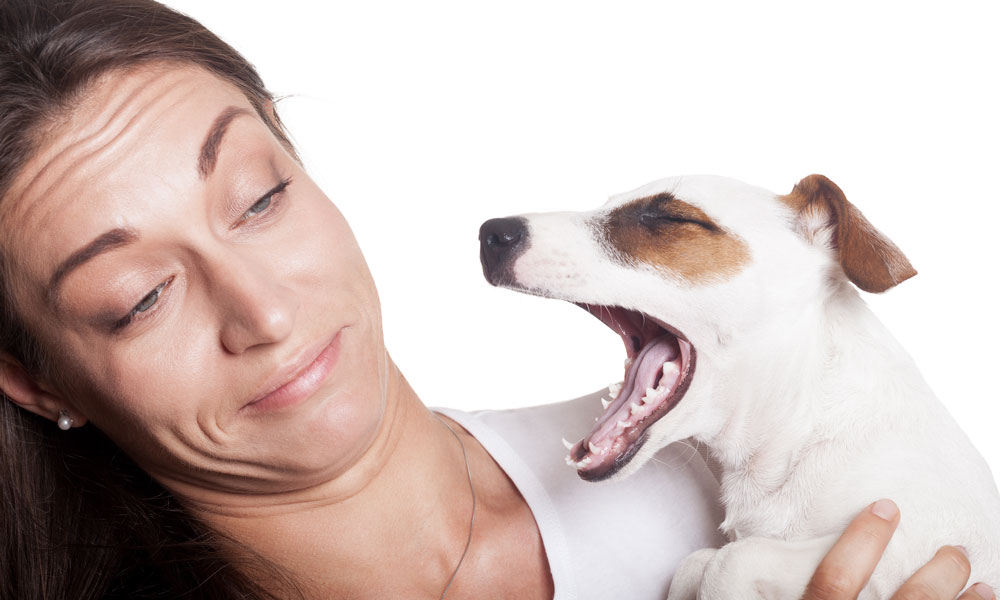Death. Toxic waste. Rotten meat. Whatever colorful adjectives you use to describe your dog’s nasty-smelling breath, you know this: It’s no laughing matter. Rank, fishy dog breath cuts through the air and into your quality time together. The more serious issue here is that ongoing halitosis signals something’s amiss with your dog health or well-being. The following will take a look at the common causes behind the funky stench, along with what you can do to freshen things up. Finally, we’ll explore how diet can play a role in reversing bad breath.
Bad breath and your dog’s oral health
When your pup has breath that wilts flowers, it’s important to review their oral health. The odors caused by bacteria in the gums may serve as an early warning that conditions are developing that lead to a serious condition called periodontal disease.
What causes periodontal disease in dogs?
When food particles build in the mouth and collect along the gumline, it’s the perfect recipe for bacteria and plaque to accumulate. Left unchecked, that can turn into an inflammation and reddening of the gums known as gingivitis. The plaque can also harden into a substance known as calculus, causing a separation of the gums from the teeth. At this stage may come a diagnosis of periodontal disease, which leads to bone loss, a breakdown of the tissue, and other painful, serious, ongoing problems for your beloved pet.
All along the way, this can be accompanied by dreadful breath, which is just part of the problem.
It’s important to understand that smaller breeds are more prone to periodontal disease. Their teeth are closer together, providing more opportunity for plaque and bacteria to build up. But whatever the size and breed of your dog, good oral care should be part of their routine.
How do you prevent periodontal disease in your dog?
In addition to regular cleanings from your trusted holistic vet, brush your dog’s teeth at home. Ideally every day. Don’t use human toothpaste, because some ingredients can actually cause harm if swallowed by dogs. Use toothpaste that is specially formulated (and flavored) to be safe and effective for canine oral health.
Keep a stash of dental chew toys in the toy box, and during playtime, active chewing can scrape off plaque and promote health.
Finally, you may want to explore water additives designed to stop bacteria growth in the mouth.
Consult with your holistic vet or independent pet supplier to help your pet achieve a fresher, cleaner mouth.
Signs of poor health in the gut
It may seem counterintuitive, but bad breath and gut health are often interconnected. Here are two other ways health problems may present themselves in your dog.
Excessive cleaning
Heads up: This is not the stuff of dinnertime conversation: the following will delve into the unpleasant subject of anal glands.
When dogs clean themselves after going to the bathroom, there may be a foul-smelling excretion from the tail area that’s transmitting into their mouth, and many pet parents describe it as fishy smelling.
On either side of your dog’s anus is a pair of anal glands or anal sacs. When your dog eliminates, the gland also releases a pungent secretion, which marks the feces with your dog’s signature scent that conveys “messages” and meaning to other dogs. That’s why dogs sniff each other in the nether regions, or pause during your walks together to investigate droppings left by other dogs.
If your dog has runny stools on an ongoing basis, the increasingly fishy scent of your pet’s breath (and body) can be just one of the cascading effects. For example, when the dog’s stools aren’t firm, then the secretion of the anal gland doesn’t get activated. The ensuing blockage then causes discomfort, which can prompt your dog to clean himself excessively, fouling his breath.
Eating waste
Unfortunately, some dogs develop a nasty habit of eating animal waste, a behavior known as coprophagia. It not only triggers disgust in you, it can be dangerous for their health, as they could be ingesting harmful microorganisms that make them sick.
The first step is to address the behavior. When possible, calmly remove their opportunity to eat what they shouldn’t be eating. When your dog goes outside to eliminate, call them away as soon as they finish and have them sit for a treat.
Likewise, if you’re out on a walk, be watchful. When they start sniffing or investigating another dog’s stools, give a firm command to prevent them from eating it.
Why do dogs eat waste? It often points to digestive issues. They may not be fully digesting and absorbing their food, which creates an instinct to “supplement,” albeit in the most disgusting way we humans can think of.
Can diet cure stinky breath in dogs?
What to do if your dog has foul breath while showing these telltale signs of gut issues? The solution may be as simple as switching to a more digestible diet.
A frequent cause of runny stools is a protein allergy or sensitivity to an ingredient in the dog food, such as beef, chicken, lamb, soy, pork and fish. Along with that, the dog’s gut can also have adverse reactions to diets that are high in corn and wheat ingredients. If bad breath accompanied by runny stools are plaguing your pet, try switching your pet’s diet to a single-source protein diet.
A microbial imbalance in your pet’s gut can keep your pet from fully digesting their food, which then comes out with frequent soft or runny stools. That’s where a diet with probiotics can kick off the healing process by crowding out that bad bacteria, and replacing it with the good. Probiotics help your pet better digest the food and absorb its nutrients. When shopping for a diet with probiotics, look for 80 million colony-forming units (CFU) per pound on the label. Brands that also feature prebiotics assure you that it has insoluble fiber, which is needed to establish the good bacteria in the gut.
The source of good breath is a healthy gut
After trying these solutions, your pet’s gut distress and bad breath should clear right up. When looking for a premium food that promotes good gut health, ask your holistic vet or independent pet supplier for NutriSource. Each bag and can is packed with Good 4 Life, an exclusive blend of supplements that offer your dog the minerals, probiotics and prebiotics they need to build a healthy gut, fresher breath and a healthy body.


